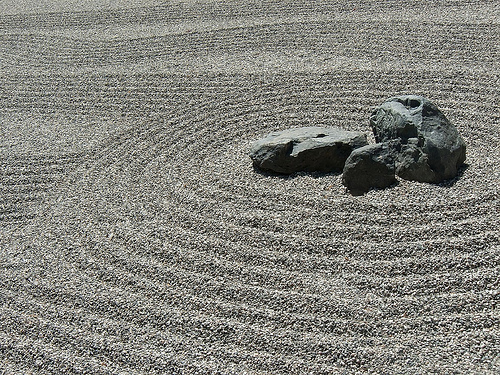
I have always been fascinated by Japanese rock gardens. Many feature three large rocks that sit within a field of raked pebbles. The three rocks of various sizes and shapes are carefully selected and then placed within the field. The field is then raked to complete an engaging, unified and balanced composition. The power of these gardens lie in the three rocks and their relationship to one another.
The gardens are an example of complete compositional control. In their pure form they never rely on color to heighten interest or symmetry to establish balance. It is interesting to consider that placing three objects in a field creates six different relationships that must be simultaneously managed. Adjusting one rock will alter the relationship and balance of the other two, and so on. (For math geeks, that is 3! or 1 x 2 x 3 = 6). If you add a fourth rock it would result in 24 different relationships that need to be simultaneously managed.
Cognitive research suggests that managing 24 relationships simultaneously exceeds the limits of the human brain’s linear decision-making capacity. It is not hard to imagine that this fact was discerned by the ancients — complete compositional control requires us to limit our focus to just three elements at a time.
I contend that our intuition, if developed properly, is the brain’s mechanism to manage decisions when the variables or complexity exceed our linear cognitive capacities.
The gardeners are allowed to enter the field; however, visitors must circle the perimeter of the garden — entering the composition with their mind. This distance ignites the imagination and allows one to experience the garden as a miniature landscape. Entering that garden in this way allows the observer to control the scale of their encounter. Very few things we experience are as well considered as the humble Japanese rock garden. I can’t help but think this is what Mies van der Rohe truly meant when he professed, “Less is more.” If it wasn’t, it is certainly what I mean when I repeat the phrase.

I was reminded of something that Anne Lamott wrote in Plan B: Further Thoughts on Faith: “I didn’t need to understand the hypostatic unity of the Trinity; I just needed to turn my life over to whoever came up with redwood trees.”
… or, Japanese rock gardens.